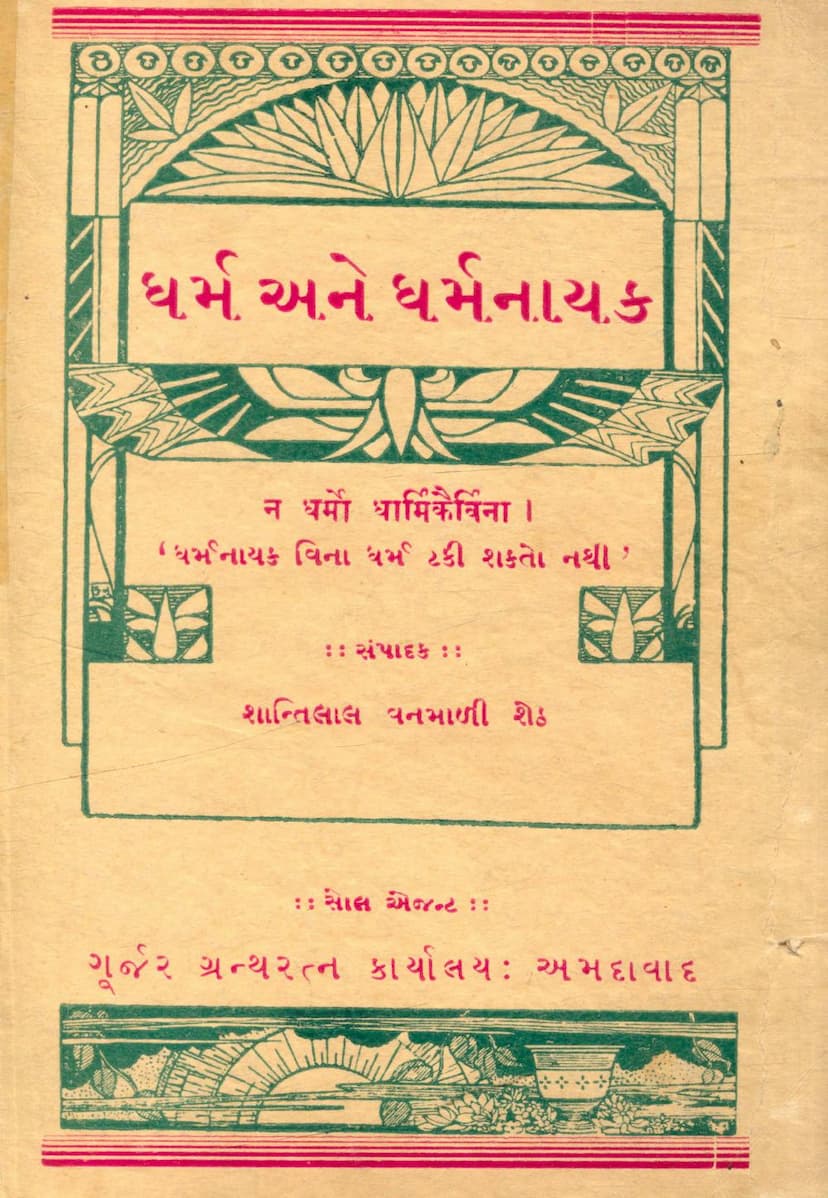Dharm Ane Dharm Nayak
Added to library: September 1, 2025

Summary
This book, "Dharm Ane Dharm Nayak" (Religion and Religious Leaders) by Shantilal Vanmali Sheth, is a compilation of religious discourses by Pujyashri Jawahar Lalji Maharaj, based on the Jain scripture Sthananga Sutra.
The central theme of the book revolves around the interconnectedness of Dharma (Religion) and Dharmanayaka (Religious Leaders or Pillars of Dharma), emphasizing the quote, "Na dharmo dharmikairvina" which translates to "Religion cannot endure without religious people/leaders."
The book elaborates on ten types of Dharma (virtues or duties) and their corresponding ten Dharmanyakas (leaders or upholders of these virtues) as outlined in the Sthananga Sutra. These ten Dharmas and their respective leaders are:
The Ten Dharmas (Virtues/Duties):
- Gram Dharma (Village Dharma): The foundational duties and conduct necessary for the well-being and order of a village.
- Nagar Dharma (City Dharma): The duties and conduct for the proper functioning and harmony of a city, building upon Gram Dharma.
- Rashtra Dharma (National Dharma): The duties and conduct pertaining to the nation, encompassing the welfare of all citizens.
- Vrat Dharma (Vow Dharma): Adherence to religious vows and commitments, emphasizing determination and steadfastness.
- Kul Dharma (Family Dharma): Duties and conduct within the family structure, focusing on maintaining lineage and tradition with virtues.
- Gan Dharma (Community/Republic Dharma): The principles of collective living, cooperation, and the functioning of a republic or community.
- Sangh Dharma (Congregation/Monastic Order Dharma): The duties and conduct related to the spiritual community of monks, nuns, and lay followers, emphasizing unity and collective spiritual progress.
- Sutra Dharma (Scriptural Dharma): The importance of understanding and following the scriptures (Sutras) and the knowledge derived from them.
- Charitra Dharma (Conduct/Behavioral Dharma): The practical application of Dharma in daily life, encompassing ethical behavior and righteous actions.
- Jivan Dharma (Life Dharma): The overarching principles of living a purposeful life, often leading to universal brotherhood and peace.
The Ten Dharmanyakas (Leaders/Upholders of Dharma):
Corresponding to each Dharma, there are ten Dharmanyakas, often referred to as "Sthaviras" or elders who embody and uphold these virtues. These include:
- Gram Sthavir (Village Elder/Leader)
- Nagar Sthavir (City Elder/Leader)
- Rashtra Sthavir (National Elder/Leader)
- Prashasta Sthavir (Educator/Preceptor Elder)
- Kul Sthavir (Family Elder)
- Gan Sthavir (Community Elder)
- Sangh Sthavir (Congregation Elder)
- Jati Sthavir (Societal/Community Elder)
- Sutra Sthavir (Scriptural Scholar/Exponent Elder)
- Paryaya Sthavir (Renunciation Elder/Elder of Renunciation)
The book delves into each of these Dharmas and Dharmanyakas, explaining their significance and the role they play in maintaining a just, ethical, and spiritually progressive society. It highlights the importance of both individual conduct (Charitra Dharma) and collective responsibility (Sangh Dharma, Gan Dharma, Rashtra Dharma) in upholding the principles of Jainism. The book also emphasizes the critical role of virtuous leaders (Dharmanyakas) in guiding the community and ensuring the continuity and practice of Dharma.
The compilation is presented as a guide for understanding true religious principles, encouraging the reader to move beyond blind faith and embrace reason and scriptural wisdom. It underscores that Dharma is not merely theoretical but must be integrated into practical life for spiritual upliftment and societal well-being.